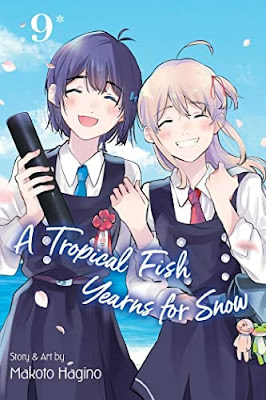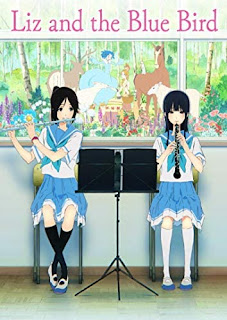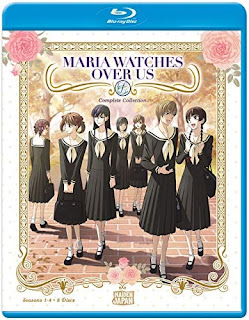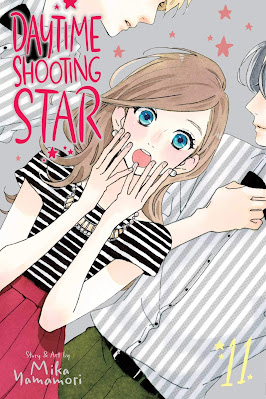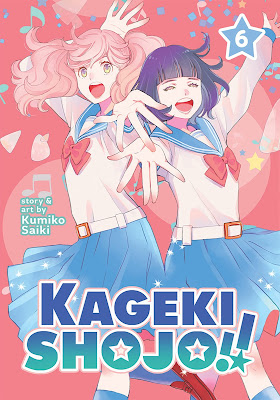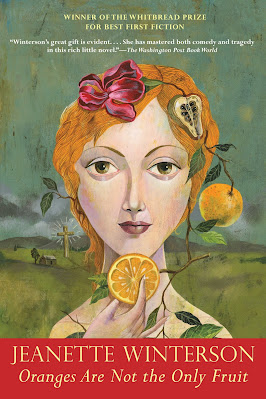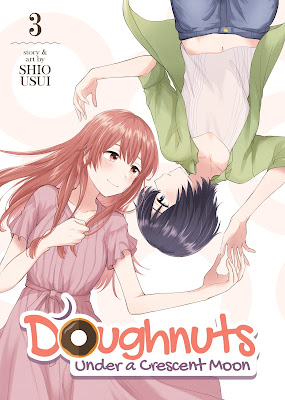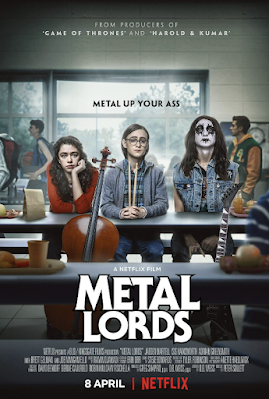Hi all, can't believe it's already mid-November. My lack of posting hasn't been for a lack of reading and watching, simply a too-busy (but good-busy) life. Moved my daughter off to college, the start of the school year (I work in education) was simply bonkers, started taking drum lessons, and I've finally started dating (my new girlfriend is so awesome!). So here are some quick thoughts on all the media I've been consuming. Enjoy:
Anime
I didn't have much hope for this. I was vaguely aware of the hype around it. I didn't know much of anything about it. I'm not sure why, but it didn't seem terribly interesting. Instead, it was probably the season's best anime by far. It was funny (actually laugh out loud funny), sweet (romantic and parental sweetness), and some good action (which isn't usually my thing in anime, but from time to time I don't mind). It is smartly written and varied enough from episode to episode to never feel the least formulaic.
If I had to quibble, our lead female character, Yor, is a mixed bag. First, I really like her character. She's cute, and sweet, and yet fierce and an assassin, but a good fake parent, and odd, and all sorts of quality characteristics. But at the same time, she's presented with some superficial meekness - the mid-twenties, office girl, shy, doesn't speak much, etc... that seems to go unquestioned in many a portrayal of women in anime/manga (or is the selling point - see "Komi Can't Communicate"). I don't think the writers of Spy X Family are trying to actively critique that "meek anime girl" stereotype when they also have Yor be an assassin. I think it's more like they are juxtaposing the two sides of her without any social commentary on the outdated depiction of women (or maybe even the outdated role of women in Japanese society). But, like I said, all that aside, I actually like her character a lot and the scenes of her coming home covered in blood as a teenager and then sitting down to help her brother with homework or whatever were really darkly funny. Basically, if you haven't watched this, you really are depriving yourself.
While not an all-time great show by any stretch, it is a supremely enjoyable watch and I can't wait for season two.
If you've been reading this blog, then maybe you've read some of my reviews of the Kageki Shojo!! manga. I've felt that it's been okay, but not great, and not quite what I thought when I first started reading it. That made watching the show an interesting venture. Compared to the manga, I actually enjoyed the show a bit more. I think it slightly streamlined and slightly altered the focus. Part of what confused me with the manga was the prologue volume "The Curtain Rises" which focuses on her roommate Ai. I really like Ai's character and was excited for her story. I also, and I need to re-read it, but I also for some reason thought there was potential for romantic feelings between Ai and Sarasa which never has gone anywhere in the main story. So I thought it was a yuri comic, but it really isn't. Knowing that, I could watch the anime without false hope.
So being a slightly more linear way of telling the story, with none of my emotional baggage dragging it down, I could focus on Sarasa and the general story. By that token, it's okay, still not great, but at least less disappointing for me. I don't think the animation is very good. Sort of a blandly normal color palette (more just a general laziness of colors, like they only had a basic water color set or something - the sky is random blue, the grass is random green) and simple but not in a stylish way. There's also some occasional anatomical awkwardness which is especially concerning with the dance (and boy howdy did I just get reamed out in the comment section of another review of mine when I critiqued the animation of another dance anime even though my F-ING SISTER is a professional ballet dancer and I've been watching dance my whole life - but noooooooo it's clearly not possible that I might feel that some dance pose wasn't well animated and how dare I note that! But I still posted that anonymous commenters frustrations at my review for the sake of discourse, anyway, I digress.)
So the story is okay, but I don't feel really emotionally invested. We're told right from the beginning that Sarasa is uniquely talented and going to do amazing things in the theater world. So if the end of this series is just her rising to the top of Kouka, then what's the point unless the journey is meaningful. So far, it really hasn't been. However, if it had been the backdrop of a yuri romance then I'd be all for that, or even if she had seemed more torn about leaving Kabuki behind, that would help.
What would be really awesome if it takes a turn and somehow she leaves Kouka to force her way back into Kabuki AND she and Ai start to develop feelings for each other! That would be interesting. But now, this feels more like a middle-school oriented story of a plucky and talented girl who everyone just can't help but rooting for sort of story. Which is fine, but meh. So the anime was a little better in some ways than the manga, but not sufficiently so.
Manga
A Tropical Fish Years for Snow Volume 9
What an infuriating series. I'm going to have to go back and re-read the whole thing to see if I missed the point or some crucial information along the way. Certainly the last few volumes have been confusing and nearly pointless. Volume 9 completes the story, but I'm not sure anymore what the story was? Was this about two friends whose lives briefly intersected? Was it two girls who realized they had romantic feelings for each other? I can't even figure out what caused their growing distance over the last few volumes.
At least for now, without re-reading it, it seems like a classic fake-yuri for the sake of capitalizing on the yuri genre, but not having anything really meaningful to say type of manga. So many are like this (at least of what gets translated to English). It's like they're afraid to either just tell a story about two female friends and make it clearly that. Or they're afraid to tell a story of actually gay teens. Or they're trying so hard for the unspoken subtext of a series like Maria Watches Over Us but not in the least bit understanding how meaningful subtext is created. And most infuriating to me is that it displays that awful manga convention of completely meaningless existential fake feelings with no moorings in any actual way real people think so that it seems meaningful but it's just pretentious nonsense writing.
Again, maybe I missed something. I wanted to re-read all nine volumes before writing this. But you know what? I had more fun things to spend my free time on. Maybe down the road I'll re-read it an like it more. But for now it honestly seems like it wasn't willing to commit to it's two teen girls having the least big of agency over their own feelings, ownership of their own feelings, or any ability to write a coherent and meaningful story in any way. What was the freakin point of this series?
Stay tuned for my re-review of the entire series as I'm almost done rereading it all.
If I Could Reach You Volume 7 This is the final volume in yet another infuriating series. However, I did re-read this final volume three times before writing this, and much like how when I was a teen I hated the ending of "Chasing Amy" but as an adult realized that although it wasn't the story book ending it was the actual correct ending, I think this volume improved with each read.
That being said, the overall story of this series sucked! There are two options for it as I see it. Option 1: actually have Uta and Kaoru get together and just go with the whole not-quite-incest thing. Or option 2: have Uta's feelings be one-sided and a school-girl crush and have Kaoru not even remotely lean into those feelings. But it sort of ends up in the middle. Closer to option 2, but not quite enough. I still think, that much like A Tropical Fish above, it thinks that ambiguity is a great way to be a great writer. Well it isn't. This isn't some experimental piece of literature. You're not writing a tone poem comic book. You're telling yet another fake yuri story but refusing to commit either way to writing people as real people.
Just like I love Takako Shumura's stories because everyone is messy and complicated and it doesn't work in the fantasy way we like but that's what makes it actually like real life, I dislike this story because they don't feel like they could be real people. That criticism having now been said, the volume and the story did improve with subsequent readings. I just wish it had owned some of the following things a bit more. Kaoru, as flawed as the writing is, is fascinating to me because I can very much see a young woman without much family falling very hard for a young man who is kind and family oriented and a protector. It makes sense that Kaoru ends up with Uta's brother. And I think her coming to realize that what she wanted at 18 (parents) is different than she wants in her 20s (a partner). I think where it leaves off with Kaoru starting over at the end would actually make a very compelling start to a series I'd much rather read.
Turning to Uta's brother, I don't quite understand why he thinks he has to marry Kaoru just because of the "death bed promise" (sarcasm for a classic manga cliché plot device) he makes with her mother. That just doesn't feel real to me (and I know it doesn't have to be real - but we still want character motivations to make sense and be relatable or at least plausible). This isn't some fable from the 12th century where he's honor bound in that way. And it isn't some grade-school cartoon where plot, character, and sense don't matter. This is just a stupid, quick, lazy plot point to force the story into motion rather than an authentic reason why they married but shouldn't have.
Are authors just not putting in effort and just taking the easy way out for a high-school girl audience? Maybe I've just hit the nail on the head with this, and A Tropical Fish, and Kageki Shojo, and others I've read recently. Have I just reached the limits of what shoujo manga can give to me as a 42 year old? I don't think so. I hope not. But maybe it's the lowest common denominator stuff being translated. My hope is that there is a lot better shoujo out there just not getting translated into English.
Daytime Shooting Start volume 12 Yet another final volume in a series I've been reading/reviewing for a while now. And another disappointing series. Maybe mostly disappointing because I came to really like the art and really like Suzume. But Shisiho still is scum for being a teacher who is romantically interested in a minor student of his. But at least Suzume has really moved on and really is with Mamura and treating him well.
A commentor had told me to stick with this series because it really comes around, and while thankfully it doesn't consumate the relationship between Shishio and Suzume, it never condems it. The closest the series gets to that is with Suzume's uncle and Shishio's friendship suffering as a result. Again, this feels like how a middle school girl might think an adult man (Shishio) would experience this.
But honestly, an adult man who likes a minor child is NOT an object of worthwhile affection or swooning over. Yes, I know, there's a long tradition in manga and anime of may/december and especially with school girls and their teachers. And, and I don't know this for a fact, but maybe that even happens with some regularity and allowance in Japanese society, but it is still not okay and nothing in this series was a commentary on that in a way that obsolves the series. Substitute Shishio for a random boy in her class and the story is just another random shoujo romance. Waste of good art and a good lead heroine.
Books
And Now Tomorrow by Rachel Field This is the second Rachel Field novel I have read. She's really not much known, but while this isn't nearly as good a novel as the prior one I read, Time out of Mind, it retained some of the unique aspects and social commentary of that better book. An Now Tomorrow takes place in a New England saw mill town. Emily's family has owned the mill for generations. But as the great depression looms, times are getting tougher, unions are forming, workers are agitating, and the writing is on the wall for the Nuevo Riche. This is set against her personal story of engagement, losing her hearing to illness, and her determination not to lose her fiancé because of it.
The romance storyline (and the ultimate pairing) are the stuff of romance novels and the story of her illness is draped with ableism and an admittedly fake treatment for deafness (and no mention of the Deaf community), the weaving in of the societal changes going on is fascinating. So if you can bear with some overwrought writing, the ableism, and a predictable (if not all together unlikable) romance, you have an interesting document of the times. That all being said, Time Out of Mind is better written and also has much of the social awareness. I found it worth reading for what it was, but your mileage may vary.
The Price of Salt (Carol) by Patricia Highsmith |
| Photo Credit Justine Larbalestier |
You may know this better by the title "Carol" which is the name given to the recent film based on the novel. At the time I read it, I actually didn't know it had anything to do with the movie (which I haven't seen, but now really need to). Basically, this turns out to be one of American literature's signature lesbian books. Patricia Highsmith has a whole personal history worth learning about. But this book holds up on its own as an incredibly moving, interesting, slow-burn, sub-text turned real, lesbian love story. Set in the 40s, it is the story of a young woman finding her place in life - balancing boyfriend, career aspirations, life in New York City - when she meets a woman in a store and is mesmerized. We're then treated to the growing friends to lovers story with an ending that was (and remains) all too rare in lesbian fiction.
It's language is beautiful (you know I'm a sucker for good writing), the characters interesting, the plot developments rewarding, and ultimately a very unique novel for the time that still holds up well today. The only things that don't are the excessive amount of smoking and an unfortunate use of the second worst "n-word." Not to say you should put any of that aside, because being put off by those things or at least pondering your own reactions to them is a worthwhile enterprise. But, other than that, the book is such a beautifully written, moving, lovely novel, that you really should read it.
The Good Neighbor (biography of Fred Rogers) The only way to talk about this biography is to break it into two parts:
1) Fred Rogers and his story, and
2) the quality of the authorship.
Most importantly, Fred Rogers emerges from this both confirming the truth and reality of everything we saw in him on TV and hoped he was in real life and an actual honest-to-goodness real person. And blessedly, the real and complex person he was doesn't in the least undermine the mythic and nearly holy figure he was in our lives (at least mine). Mr. Rogers (I'll use Mr. when I'm talking about TV Fred) was a source of great comfort to me. I loved the pace, the tone, the look of the puppets, everything about it. And when you can say someone is your hero, you put them on a perch. And people on perches are sadly easy to knock off (or fall off themselves - I'm looking at you Neil deGrasse Tyson).
But it turns out that Fred Rogers truly lived his life the way he taught others to do on his show. That doesn't mean there weren't complexities. What emerges of the real-world Fred Rogers is someone who managed to be so deeply committed to his belief in what people could be and the importance of starting that with children who also was a very good and beloved person in real life.
Yes, there were times he grew frustrated at his own children (what parent doesn't), there were times where his work schedule was nearly impossible for others in the company to keep pace with, but he was never unkind to people. He gave each and every human being he ever met (whether family, co-worker, friend, or stranger on the street) every ounce of his time, attention, and commitment. I was completely and totally fascinated by the thoughtfulness of how he created his TV show as well as the brilliance of the real man, a truly beautiful and true person. How exceptional to have one's childhood hero elevated by their real life, rather than destroyed by it.
On the other hand, the author of the book, while someone who knew and worked with Fred over many years, can hardly be called a writer. The chapters appear to be loosely chronological and thematic. There is a lot of going back and forth in time to meet with the themes. However, the expressed themes don't really always match with the digressive nature of the writing. The author will drift to random thoughts and stories and back again, will offer unfounded or unexplained statements and leave them dangling, and overall it's just a generally disorganized presentation.
Thankfully, none of it diminishes the information or the picture of Fred Rogers we come to understand. It just isn't a great read from the standpoint of "use of language." If I had one other potential reservation about the writing, is that there is a potential for bias in that the person writing about him clearly knew him well and could not be objective. They must have had a great relationship, because nothing in this suggests that Fred Rogers was even capable of really turning anyone off. And thankfully it doesn't beatify him, but seems to show just how beautifully real and consistent he was. However, one wonders what an objective biographer would have uncovered or chosen to use that was perhaps left out. I have no evidence of this, and frankly, don't really want any. I loved Mr. Rogers and found Fred Rogers just as, if not more, amazing. I am very thankful for that.
The Impending Blindness of Billie Scott (graphic novel) by Zoe Thorogood In anticipation of her newest graphic novel being released (It's Lonely at the Center of the Earth"), I decided to pick up an earlier work ("The Impending Blindness of Billie Scott"). I first encountered Zoe Thorogood on Instagram and immediately was taken with her line work, her visuals, her funky honest emotional drawings. Billie Scott has all of that, but also shows an artist earlier in their career than what she is producing now. It centers on a young, poor, reclusive painter. Tragedy strikes and Billie Starts losing his vision. Who is a painter if they cannot see? The story is journey of the last few days of Billie's vision. That's a hell of a story to tackle your first time out!
From a graphical perspective, there is a looseness of form that doesn't always appeal to me (but might not bother others) and in general is just isn't as crisply executed as her newest work (I'll review "It's Lonely" soon). The other thing, if I'm to find fault (and I don't mean it to sound like this, but I know it's coming out this way), is that the story, while ambitious in some ways, doesn't necessarily feel completely honest - there's a bit of glossing over (even amongst the griminess) and then an ending that feels a little too perfect.
I think it's overall a big work for a young artist that shows her potential and I hope to see her newest graphic novel grow from that potential. Fans of indie comics should check this out. But I think we'll look back in time and find it the weakest in her oeuvre. And that's totally okay.
✩🚺
Please legitimately purchase or borrow manga and anime. Never read scanlations or watch fansubs. Those rob the creators of the income they need to survive and reduce the chance of manga and anime being legitimately released in English.
All comments are moderated by a real person who only checks them once a day. Therefore, comments may take a while before they show up. Thanks for understanding. It's how we keep this a community of lovingkindness.

